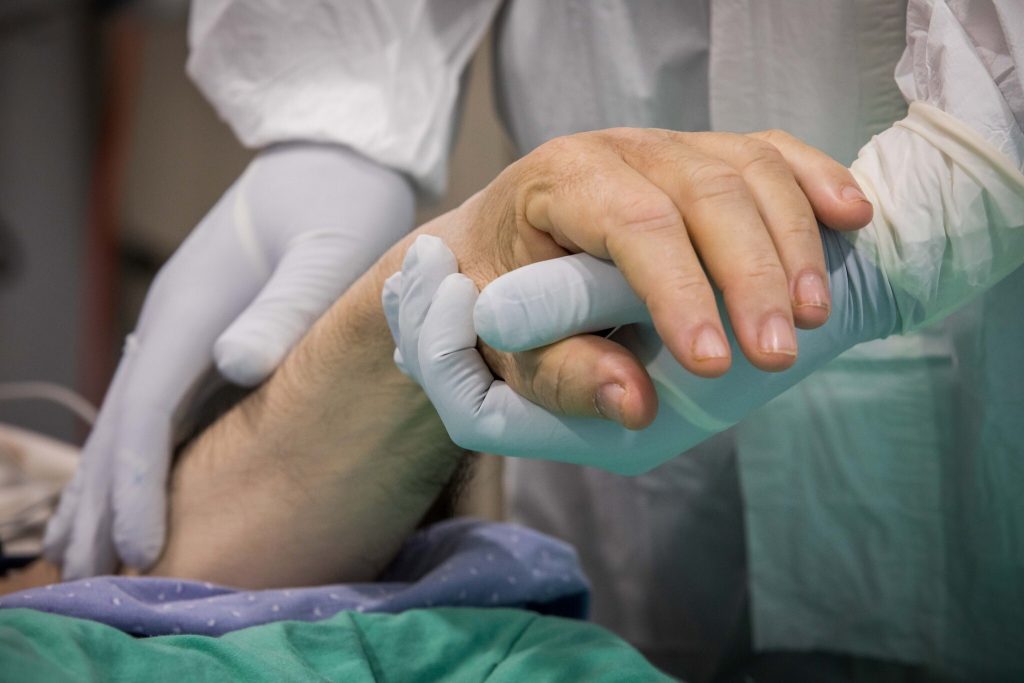How An African Protection From Smallpox Came To Be Used In Colonial Boston

Mayanei Hayeshua Medical team treat a patient with coronavirus disease (COVID-19) at the coronavirus unit, in Mayanei Hayeshua Medical Center, Bnei Brak, Israel, April 13, 2020. Photo by Nati Shohat/Flash90 *** Local Caption *** מחלקה חולה בני ברק מעייני הישועה מחלקת קורונה וירוס חולה חולים
In the early 18th century, American colonists faced constant threat from deadly infectious diseases — scarlet fever, diphtheria, influenza and yellow fever.
The most feared disease was smallpox. The pathogen was dangerously contagious and caused fever, fatigue and bodywide skin pustules that left disfiguring scars. The smallpox death rate was as high as 30%.
On April 22, 1721, a British vessel called HMS Seahorse sailed from Barbados to Boston carrying deadly smallpox. Despite precautions taken by the sailors, the virus spread throughout Boston, killing almost 15% of the city’s population. Far more Bostonians would have died if not for enslaved Africans who shared knowledge of a rudimentary process that conferred immunity from smallpox.
“The 1721 smallpox outbreak is an early example of African influence on Western medicine,” said Elise Mitchell, a postdoctoral history fellow at Princeton University.
Cotton Mather, a prominent Boston minister, learned of the technique from a young man whom he had enslaved and called Onesimus. Mather would push to inoculate almost 300 Bostonians — the first such effort documented in America. Mather described Onesimus, who had likely been taken from the part of Africa that is now Ghana, as an “intelligent fellow.”
“The story of Onesimus is important because it is one where … a slave is shaping history around him,” said Steven J. Niven of Harvard University’s Hutchins Center for African & African American Research. “He had a major impact on saving lives.”
Inoculation involved taking pus from a smallpox pustule of an infected person and inserting it through a cut or a needle prick into the skin of a healthy person. It was risky, in that it could cause severe disease and death in someone who was healthy, but often enough it caused a mild case of smallpox and provided immunity from future infection. The practice had been used for centuries in parts of Asia and Africa, and many enslaved people, including Onesimus, had been inoculated prior to being taken to America.
Mather wrote about a conversation in which he asked Onesimus if he had ever had smallpox. Onesimus answered: “Both yes and no.” He told [Mather] that “he had undergone the operation which had given something of the smallpox and would forever preserve him from it,” adding that it was common among the Coromantee, a reference to West Africa. Onesimus showed a scar on his arm as proof.
Fascinated, Mather interviewed other enslaved people, and all told a similar story.
The practice was controversial. When HMS Seahorse brought a smallpox epidemic to Boston in 1721 and Mather urged Bostonians to get inoculated, only physician Zabdiel Boylston was willing to use the method. (He first tested it on his 6-year-old son and two enslaved men.)
Despite an environment of public vitriol, Mather and Boylston recruited 287 Bostonians to be inoculated. Mather reported the outcome to the Royal Society of London, one of Europe’s oldest scientific societies.
“Bostonians who weren’t inoculated were seven times more likely to die than those who were inoculated, and Mather and Boylston had the data” to prove it, says Niven. Because Mather had data to back up the stories told by enslaved people, inoculation was increasingly accepted in America’s colonies. Fifty years later, George Washington required his soldiers to be inoculated, and many historians credit that policy with helping the colonists win the Revolutionary War.
The Boston effort laid the groundwork for a safer smallpox vaccine to be developed by Edward Jenner in 1796. Nearly two centuries later, in 1980, smallpox was eradicated, thanks to a global vaccination effort.
Onesimus bought his freedom from Mather, but historians don’t have records of his life thereafter. Nevertheless, he lives on as an exceptional influence on early American history, a savior of countless lives.


